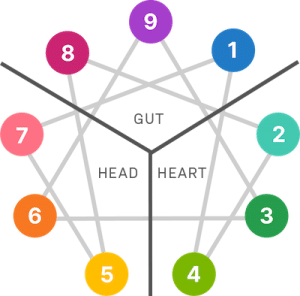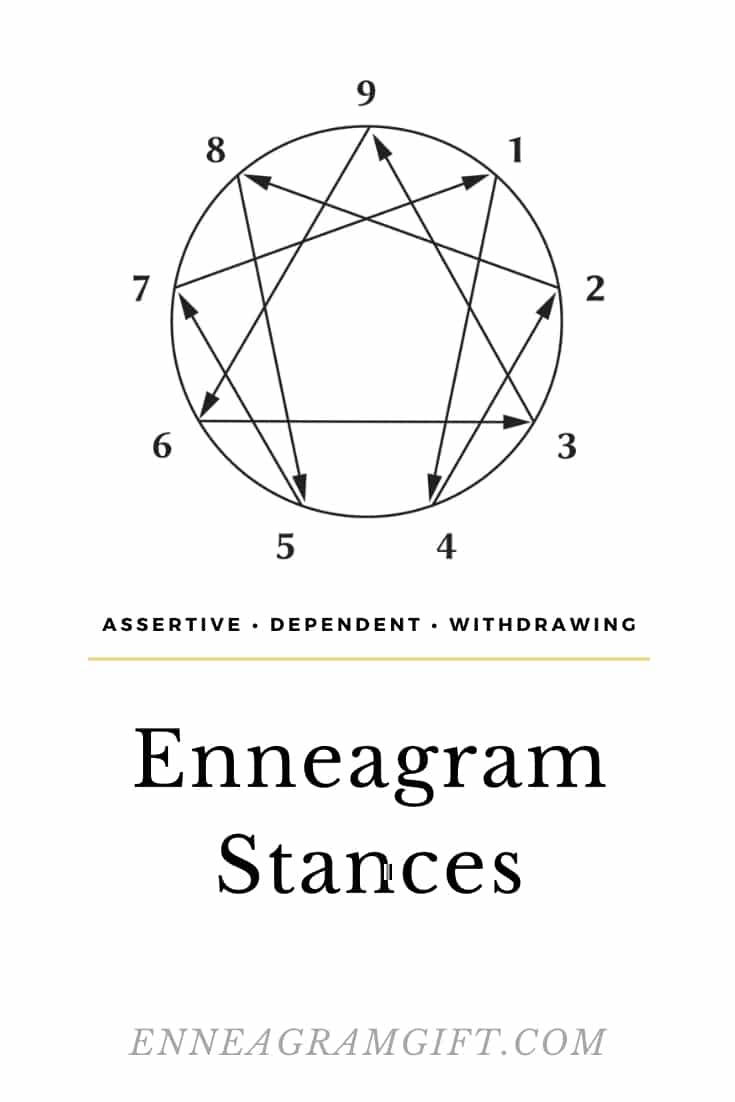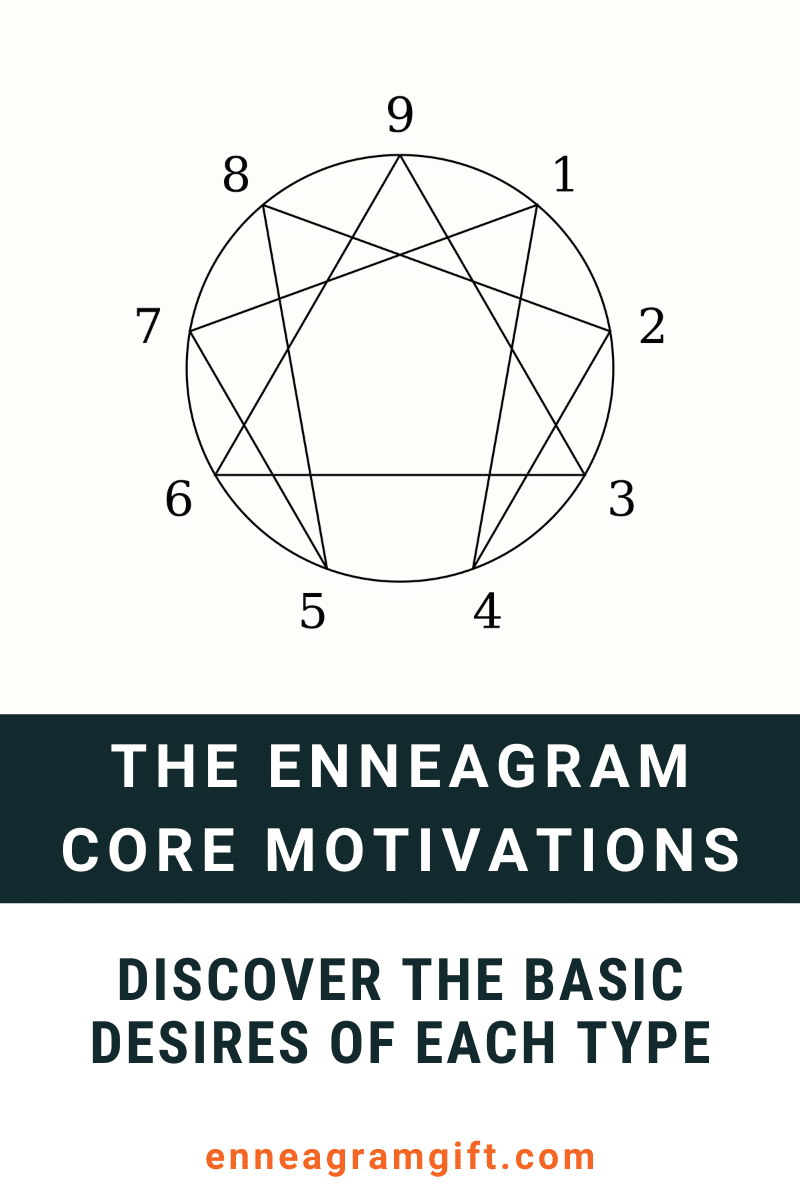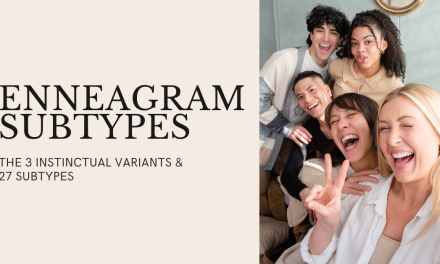Do you ever wonder why certain emotions seem to govern your reactions and decisions? The Enneagram Triads offer a compelling framework to help you decode this emotional blueprint, providing clarity on how your personality type shapes your emotional responses. By identifying with one of the Enneagram Triads, you gain valuable insights into the core motivations that drive your actions and influence your relationships.
As the founder of Enneagram Gift, my engagement with the Enneagram began with a profound connection to the experiences of a panel of Type 5’s in 2018. This understanding has deepened my commitment to helping others navigate their own Enneagram journeys. Through my work, including authoring resources like The Enneagram Career Guide For All 9 Types, I’ve dedicated myself to the study and application of the Enneagram in personal growth and team dynamics.
This guide will introduce you to the three Enneagram Triads—The Head, The Heart, and The Gut. Each triad groups together three Enneagram types linked by a dominant emotional theme. Recognizing your triad can illuminate the underlying fears and desires that often remain hidden, yet significantly impact your life.
By understanding your triad, you’ll be equipped with the knowledge to better manage your emotions, rather than letting them manage you. This can lead to improved interactions with friends and family and a more harmonious life. Read on to discover the defining features of each triad and how this awareness can transform your approach to challenges and relationships.
What Are The Enneagram Triads?

The Enneagram Triads, also known as the Centers of Intelligence, categorize the nine Enneagram types into three distinct groups based on their primary emotional responses and decision-making processes: the Heart (Feeling) Triad, the Head (Thinking) Triad, and the Gut (Instinctive) Triad. Each Triad corresponds to a center of emotional intelligence that predominates the personality types within it, shaping their motivations, fears, and how they interact with the world.
The Heart Triad (Types 2, 3, & 4): This group navigates life through emotions, particularly focusing on the desire for love and acceptance. They are attuned to relationships and personal identity, often grappling with feelings of shame when they perceive a lack of validation.
The Head Triad (Types 5, 6, & 7): Types within this triad approach life with analysis and foresight, driven by a need for security and certainty. They are thoughtful and strategic but may struggle with anxiety and fear when faced with uncertainty.
The Gut Triad (Types 8, 9, & 1): These types rely on instinct and body-based knowing, seeking autonomy and control. They possess a natural confidence but can experience anger when their sense of order is challenged.
The Role of Self-Awareness
Understanding which Triad you belong to is more than an exercise in self-categorization; it’s a step towards profound self-awareness. By recognizing the dominant emotional drivers of your personality type, you can begin to observe how they influence your reactions and decisions. This awareness is the first step in developing emotional intelligence, allowing you to manage your responses proactively rather than being led by them reactively.
For instance, a Type 2 might notice their tendency to seek appreciation and use this awareness to cultivate self-validation rather than overextending themselves for others. A Type 5 might recognize their fear of incompetence and challenge themselves to engage more openly with new experiences.
Each Triad presents unique opportunities for personal growth. By confronting the core emotions of shame, fear, and anger, individuals can work towards a more balanced and integrated self. This journey involves acknowledging vulnerabilities, understanding the root of emotional responses, and cultivating practices that foster emotional resilience. In doing so, the Enneagram Triads serve not just as insight into our emotions but as a compass for our growth, guiding us towards a more emotionally intelligent and fulfilling life.
In Summary
To encapsulate, the Enneagram’s Heart, Head, and Gut Triads illuminate the primary emotional landscapes of our personalities—shame, fear, and anger, respectively. Recognizing your Triad can empower you to harness these emotions constructively:
- Heart Triad (2,3 & 4): Embrace feelings as a source of empathy and connection, not just as vulnerabilities.
- Head Triad (5, 6, & 7): Channel thoughts into strategic action and confidence, rather than letting fear dictate choices.
- Gut Triad (8, 9, & 1): Use instincts to lead decisively and passionately, while tempering anger with understanding.
By understanding and working with your Triad, you can transform your core emotional responses into strengths that enhance decision-making and personal growth.

The Enneagram Heart Triad: Navigating the Sea of Emotion
The Heart Triad, also known as the Feeling Triad, includes Types 2, 3, and 4, each navigating the world with a keen emotional compass. Their actions are often colored by the pursuit of identity, recognition, and affection, with a shared underlying current of shame that can either motivate or hinder them.
The Vibrant Type 2: The Helper’s Quest for Love
Type 2s are the quintessential supporters, their generosity knowing no bounds. Yet, beneath their altruistic exterior lies a vulnerability—a fear that their worth is tied to their helpfulness.
Jamie’s Journey:
Jamie, a Type 2, found herself exhausted, always saying ‘yes’ to others at the expense of her well-being. It was only after a friend pointed out this pattern that Jamie began to set boundaries, discovering that self-care was not selfish but necessary for her to continue helping others authentically.
Embracing Self-Worth: For Type 2s, the path to overcoming shame involves:
- Setting Boundaries: Learning to say no and understanding that self-care is not selfish.
- Prioritizing Needs: Recognizing their own needs as valid and expressing them to others.
- Seeking Balance: Fostering relationships that offer mutual support and appreciation.
The Ambitious Type 3: The Achiever’s Battle with Recognition
Type 3s are the driven Achievers, always striving for success. They often equate their value with their achievements, and when accolades are absent, they grapple with feelings of worthlessness.
Alex’s Achievement:
Alex, a Type 3, had climbed the corporate ladder rapidly. Yet, he felt empty, realizing that his relentless pursuit of success was a mask for his fear of being seen as a failure. By embracing his intrinsic worth, Alex learned to appreciate the journey, not just the destination.
Cultivating Authentic Confidence: Type 3s can find balance by:
- Valuing the Process: Recognizing that true achievement lies in growth, not just outcomes.
- Embracing Vulnerability: Allowing themselves to show imperfection and connect more deeply with others.
- Celebrating Small Wins: Acknowledging and finding joy in the small successes along the way.
The Expressive Type 4: The Individualist’s Dance with Identity
Type 4s are the Individualists, deeply in touch with their inner world. They yearn to be seen and understood, yet fear they lack a significant identity.
Eli’s Expression
Eli, a Type 4, often felt misunderstood, which led him to retreat into his art. It was through his creative expression that he found a way to communicate his unique perspective, turning his feelings of isolation into a bridge for connection.
Finding Harmony in Authenticity: Type 4s can navigate their emotions by:
- Seeking Understanding: Engaging in self-reflection to understand their emotions deeply.
- Expressing Creatively: Channeling their rich inner life into creative endeavors.
- Building Self-Acceptance: Recognizing their uniqueness as a strength, not a flaw.
5 Ways Of Overcoming Shame Across the Heart Triad

For all members of the Heart Triad, overcoming shame is about recognizing their inherent value independent of external validation. Here are some strategies that can help:
- Clarify Expectations: Communicate openly with others about your needs and desires.
- Practice Self-Care: Engage in activities that nourish your body, mind, and spirit.
- Express Your Feelings: Find safe spaces and trusted individuals to share your emotions.
- Acknowledge Your Past: Reflect on past hurts without letting them define you.
- Celebrate Your Strengths: Make a habit of recognizing your positive qualities and achievements.
By integrating these practices, Types 2, 3, and 4 can foster a sense of self-assurance that transcends the need for external approval, allowing them to engage with the world from a place of strength and authenticity.
The Enneagram Head Triad: Mastering the Mind’s Maze
The Head Triad, encompassing Types 5, 6, and 7, represents the intellectual center of the Enneagram. These types engage with the world through analysis, planning, and foresight, with fear as their common emotional backdrop, influencing their decision-making process.
The Inquisitive Type 5: The Investigator’s Quest for Knowledge
Type 5s, known as Observers, are the quintessential seekers of understanding. Their thirst for knowledge is both a shield and a sanctuary, providing a sense of control in a world that often feels overwhelming.
Sam’s Solitude
Sam, a Type 5, found solace in his extensive library, yet his retreat into books was also a barrier to connection. When he started sharing his insights, he discovered that his knowledge was a bridge to relationships, not just an island of self-preservation.
Embracing Engagement: For Type 5s, overcoming fear involves:
- Sharing Knowledge: Venturing to share insights without waiting for perfect understanding.
- Building Connections: Actively seeking out and valuing interpersonal relationships.
- Balancing Solitude: Finding a healthy equilibrium between alone time and social interaction.
The Steadfast Type 6: The Loyalist’s Commitment to Security
Type 6s are the Loyalists, whose dedication to their communities is unmatched. Their vigilance is a double-edged sword, providing both safety and a propensity for anxiety.
Olivia’s Overthinking
Olivia, a Type 6, was the go-to person in a crisis but struggled with constant worry. By practicing mindfulness and trusting her intuition, she learned to distinguish between protective foresight and paralyzing fear.
Cultivating Calm: Type 6s can find serenity by:
- Practicing Mindfulness: Engaging in activities that ground them in the present moment.
- Trusting Themselves: Building self-confidence to rely on their own judgment.
- Seeking Support: Creating a network of trusted individuals for guidance and reassurance.
The Adventurous Type 7: The Enthusiast’s Dance with Possibility
Type 7s, known as Enthusiastic Visionaries, are the embodiment of joy and exploration. However, their pursuit of pleasure can sometimes be a flight from the depths of fear.
Diego’s Dilemma
Diego, a Type 7, was always the spark of any gathering, yet his constant activity was a distraction from inner turmoil. Embracing stillness, he found that facing his fears was the first step to genuine freedom.
Seeking Depth: Type 7s can navigate their fears by:
- Embracing Stillness: Allowing themselves time to reflect and process emotions.
- Completing Projects: Committing to follow through on tasks to their conclusion.
- Cultivating Depth: Seeking meaningful experiences that go beyond surface-level enjoyment.
4 Ways Of Overcoming Fear Across the Head Triad

For all members of the Head Triad, addressing fear means engaging with the world in a way that acknowledges risk but doesn’t allow it to paralyze. Here are some strategies that can help:
- Foster Community: Build a supportive network that provides both comfort and perspective.
- Keep a Journal: Document thoughts and fears to process and understand them better.
- Establish Routines: Create a sense of stability through regular habits and rituals.
- Practice Gratitude: Focus on the positive aspects of life to counterbalance fear.
By adopting these practices, Types 5, 6, and 7 can develop a more grounded presence, allowing them to think clearly and act confidently, free from the constraints of fear.
The Enneagram Gut Triad: Navigating the Intensity of Instinct
The Gut Triad, composed of Types 8, 9, and 1, is the embodiment of instinctual intelligence within the Enneagram. These types are characterized by their reliance on gut feelings to navigate the world, often manifesting a strong will and a desire for autonomy. Their common emotional theme is anger, which can arise when their sense of control is challenged.
The Assertive Type 8: The Challenger’s Path to Empowerment
Type 8s, known as Challengers, exude confidence and determination. They engage with life through a lens of strength, often advocating for justice and protection for the underdog.
Alex’s Leadership
Alex, a Type 8, thrived in leadership roles but struggled with collaborative environments. Learning to channel their intensity into mentorship, they found that empowering others did not diminish their own strength but rather amplified it.
Embracing Vulnerability: For Type 8s, mitigating anger involves:
- Seeking Collaboration: Recognizing the value of teamwork and shared victories.
- Expressing Emotions: Allowing themselves to show vulnerability as a form of strength.
- Practicing Empathy: Understanding others’ perspectives to foster deeper connections.
The Mediating Type 9: The Peacemaker’s Quest for Harmony
Type 9s are the Peacemakers, often serving as bridges between differing viewpoints. Their calm demeanor belies a deep desire for inner and outer peace.
Bella’s Balance
Bella, a Type 9, was adept at diffusing tension but often neglected her own voice. By asserting her needs, she found that she could maintain harmony without sacrificing her well-being.
Cultivating Self-Expression: Type 9s can address anger by:
- Communicating Needs: Regularly expressing their own desires and boundaries.
- Embracing Conflict: Understanding that healthy conflict can lead to positive change.
- Prioritizing Self-Care: Recognizing their own importance and practicing self-advocacy.
The Principled Type 1: The Reformer’s Drive for Improvement
Type 1s, called Reformers, are motivated by a sense of purpose and the pursuit of integrity. Their high standards are a testament to their commitment to excellence.
Carlos’s Critique
Carlos, a Type 1, was a natural at spotting areas for improvement but often came across as overly critical. By learning to deliver feedback with compassion, he became a catalyst for positive change without alienating others.
Embracing Imperfection: Type 1s can alleviate anger by:
- Accepting Flaws: Recognizing that imperfection is a universal human trait.
- Offering Grace: Extending the same understanding to others that they seek for themselves.
- Sharing Insights: Providing guidance with kindness rather than judgment.
4 Ways Of Overcoming Anger Across the Gut Triad

For all members of the Gut Triad, confronting anger means understanding its roots and channeling this powerful emotion constructively. Here are some strategies that can help:
- Engage in Physical Activity: Use exercise as an outlet for pent-up energy.
- Seek Constructive Solutions: Focus on problem-solving rather than dwelling on frustration.
- Practice Mindfulness: Recognize triggers and learn to pause before reacting.
- Communicate Effectively: Use “I” statements to express feelings without blame.
By adopting these practices, Types 8, 9, and 1 can harness their instinctual energy to lead with confidence, create harmony, and inspire change, transforming anger into a force for good
Practical Applications: Harnessing Your Triad for Growth
For the Heart Triad (Types 2, 3, & 4)
Self-Compassion Exercise: Start a daily journaling practice where you write down three things you appreciate about yourself. This can help combat feelings of shame and foster self-acceptance.
Emotional Awareness Meditation: Spend 5 minutes each day in quiet reflection, focusing on your breath. When emotions arise, label them without judgment and return to your breath. This practice can heighten emotional intelligence and create space between feelings and reactions.
For the Head Triad (Types 5, 6, & 7)
Cognitive Restructuring: Challenge your fear-driven thoughts by asking yourself, “Is this thought based on facts or assumptions?” Write down more rational and balanced perspectives.
Mindfulness Breaks: Throughout the day, take short breaks to ground yourself in the present moment. Use your senses to observe your environment, which can help interrupt the cycle of overthinking and anxiety.
For the Gut Triad (Types 8, 9, & 1)
Anger Management Techniques: When you feel anger rising, engage in a physical activity or use breathing exercises to dissipate the energy. Reflect on the cause of your anger to find constructive solutions.
Assertiveness Training: Practice stating your needs and boundaries clearly and respectfully. Role-play scenarios with a friend or in front of a mirror to build confidence in your communication skills.
Discover Your Enneagram Triad: A Quick Quiz
Instructions: Read each statement and choose the option that resonates most with you. At the end of the quiz, the majority of your choices will point towards a specific triad.
1. When faced with a difficult situation, I am most likely to:
A. Reflect deeply on how it makes me feel.
B. Analyze the situation and consider all possible outcomes.
C. Trust my gut and take action.
2. In social settings, I find myself:
A. Tuning into the emotions and needs of others.
B. Observing and thinking before I engage.
C. Leading the group or seeking activities.
3. I often struggle with feelings of:
A. Not being seen or appreciated for who I am.
B. Uncertainty and anxiety about the future.
C. Frustration when things don’t go as planned.
4. My approach to decision-making is usually:
A. Guided by my feelings and values.
B. Logical and well-thought-out.
C. Quick and based on my instincts.
5. When it comes to personal challenges, I:
A. Look for love and validation.
B. Seek knowledge and security.
C. Aim for independence and control.
6. I find it difficult to:
A. Disconnect from the emotional atmosphere around me.
B. Stop planning and anticipating problems.
C. Show vulnerability and let go of control.
7. In my relationships, I:
A. Often put others’ needs before my own.
B. Can be reserved and prefer a few close connections.
C. Am straightforward and value honesty and strength.
8. When I think about what I want in life, I am mostly driven by:
A. The desire for meaningful and deep connections.
B. The need for understanding and competence.
C. The pursuit of autonomy and respect.
Scoring:
If you chose mostly ‘A’s, you likely belong to the Heart Triad (2, 3, & 4). You are empathetic, emotional, and value relationships, but may struggle with feelings of shame.
If you chose mostly ‘B’s, you likely belong to the Head Triad (5, 6, & 7). You are thoughtful, inquisitive, and seek understanding, but may be driven by underlying fears.
If you chose mostly ‘C’s, you likely belong to the Gut Triad (8, 9, & 1). You are action-oriented, confident, and trust your instincts, but may often contend with anger.
Remember, this quiz is a simplified tool for exploration and may not capture the full complexity of your personality. For a more comprehensive understanding, consider a full Enneagram assessment. If you want to further explore Enneagram Triads and your type by taking a test, check our list of The Five Best Free Enneagram Tests Online.
Enneagram Triads: A Pathway to Self-Discovery and Growth
The Enneagram offers a profound framework for understanding ourselves and others through its division into three core Triads: the Heart, Head, and Gut. These Triads serve as mirrors, reflecting the most intimate aspects of our inner world:
- Emotions: They reveal the heart of our feelings, whether it’s the shame that seeks acceptance, the fear that craves security, or the anger that strives for autonomy.
- Desires: Each Triad is driven by a deep-seated yearning—for love, for knowledge, or for control—that shapes our life’s narrative.
- Fears: Our most significant fears—of being unworthy, of being unsupported, or of being powerless—reside within these Triads, influencing our reactions and decisions.
- Flaws: By highlighting our imperfections and tendencies towards unhealthy behaviors, the Triads encourage us to confront and transform our weaknesses.
Recognizing and understanding your primary Enneagram Triad is more than an exercise in self-typing; it’s a journey towards self-improvement. It’s about acknowledging the raw truth of who we are—our emotional triggers, hidden desires, deepest fears, and all-too-human flaws. This awareness is the first step in moving from a place of reactivity to a stance of empowerment.
The goal is not to dwell on the shortcomings but to use this knowledge as a catalyst for personal growth. By focusing on self-care and self-improvement, we can transcend our limitations and evolve into more balanced, resilient, and compassionate beings. The Enneagram doesn’t just offer insight—it offers assistance for becoming the best version of ourselves. It’s a call to introspection and action, urging us to take responsibility for our personal development while extending grace to ourselves and others in the process.
For More Helpful Enneagram Resources:




